
Zoom Was Our Stage. And It Was A Great One.
An essay by young artists about their leadership, collaboration and connection while devising a performance in the digital age of quarantine.
The pandemic meant a loss of so many opportunities, especially for young people. We missed the end of the school year, graduations, dances and almost all of summer’s typical rituals. For young artists, it seemed like we had lost theater too. To my mind, the end of being able to physically come together certainly spelled out the end of an art so reliant on ensemble. So needless to say I had my hesitations when I heard The Rose Theater was doing a digital Conservatory camp. It seemed like all the things I valued about theater were missing, performing live, interacting with an audience, forming bonds with your cast and creating something unique. I didn’t think that was possible when we were all stuck at home, confined by Zoom’s talking boxes. That wasn’t the theater I knew and loved… but it ended up being so much more. –Isabella Manhart (High School Junior)
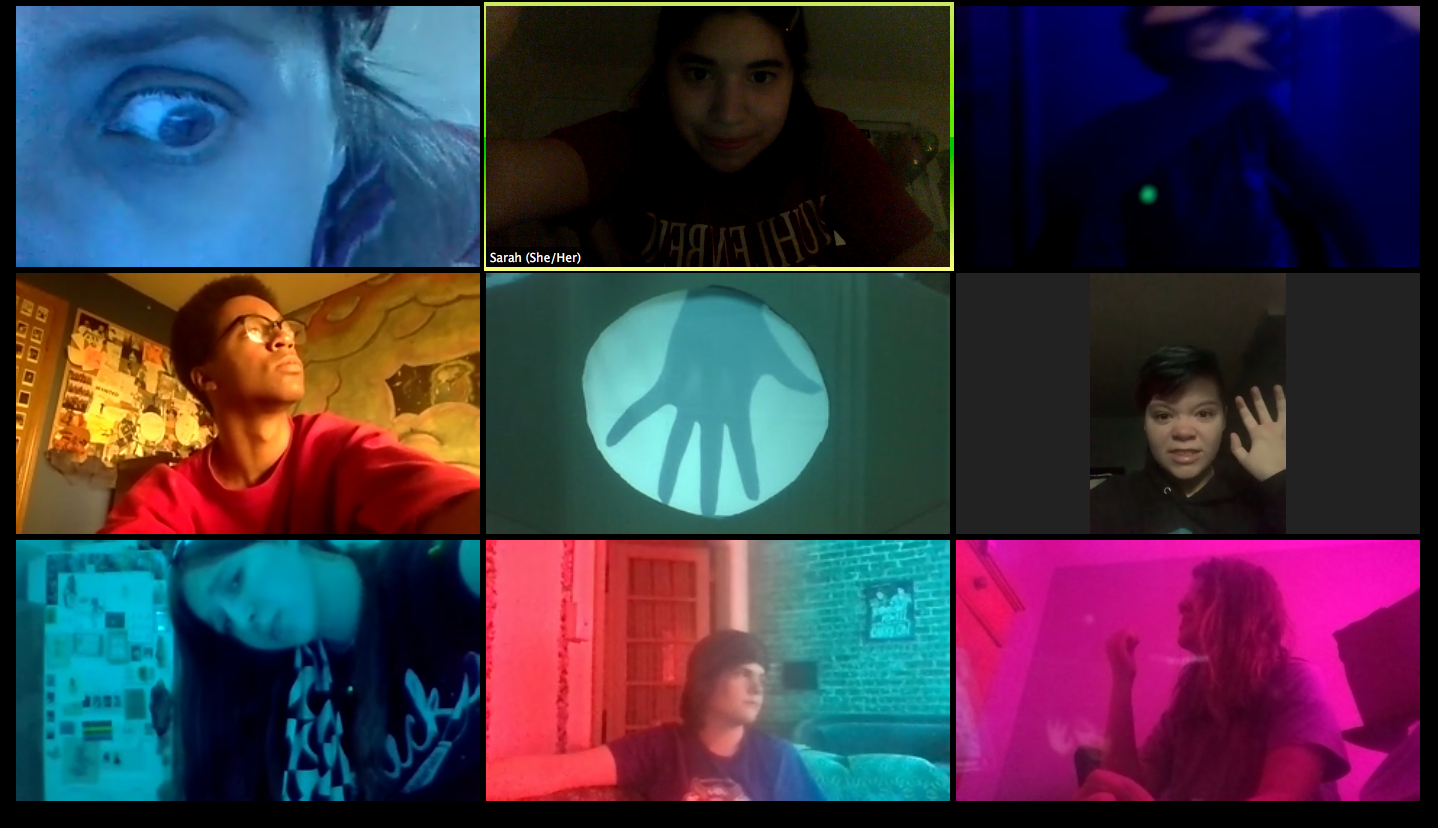
——————————————————————————————————
Like many other educational theaters, during the Coronavirus quarantine of June of 2020, The Rose Theater in Omaha, Nebraska began summer camp rehearsal under the unimaginable circumstances of a global pandemic. The Rose’s Conservatory production camp collaborated to create a retelling of Mary Shelly’s Frankenstein** completely over Zoom with seven teenage students and two teaching artists. Our adaptation of Frankenstein was recorded in one continuous session, with no editing. All the sets, puppets, musical composition and performances were created by our artistic ensemble during a four week camp.
As an ensemble we not only had to figure out a new digital medium to produce a culminating performance, but most importantly establish a safe rehearsal classroom environment to allow students to grow, connect and create. There were many expectations from both the students and teaching artists perspective on what a fully digital rehearsal might feel like. This article is a demonstration of what transparent student and teacher communication, wild passion, peer leadership, intense student driven dramaturgy, and constantly raising the horizon can accomplish in a Zoom rehearsal room- acknowledging that there is lots of space to grow.
This article is written entirely by the teenage artists and their college summer intern director (with support by the full time staff teaching artist). We hope to lead, support, and help raise the horizon of expectations of what young artists creating theater can do during this global pandemic. Creating opportunities for young people to lead and share their voice, is the most important role we as adults can offer in a time of constant change, fear, and unfamiliarity. Their clarity in collaboration has constantly exploded many folx assumption of what a “young artist” can do. We appreciate being welcomed to the table. –Stephanie Jacobson (Rose Theater Teaching Artist)
————————————————————————————————————
“In the beginning, a boat, a trombone and lots of great coordination.”–Jules Wuestewald ( High School Junior)
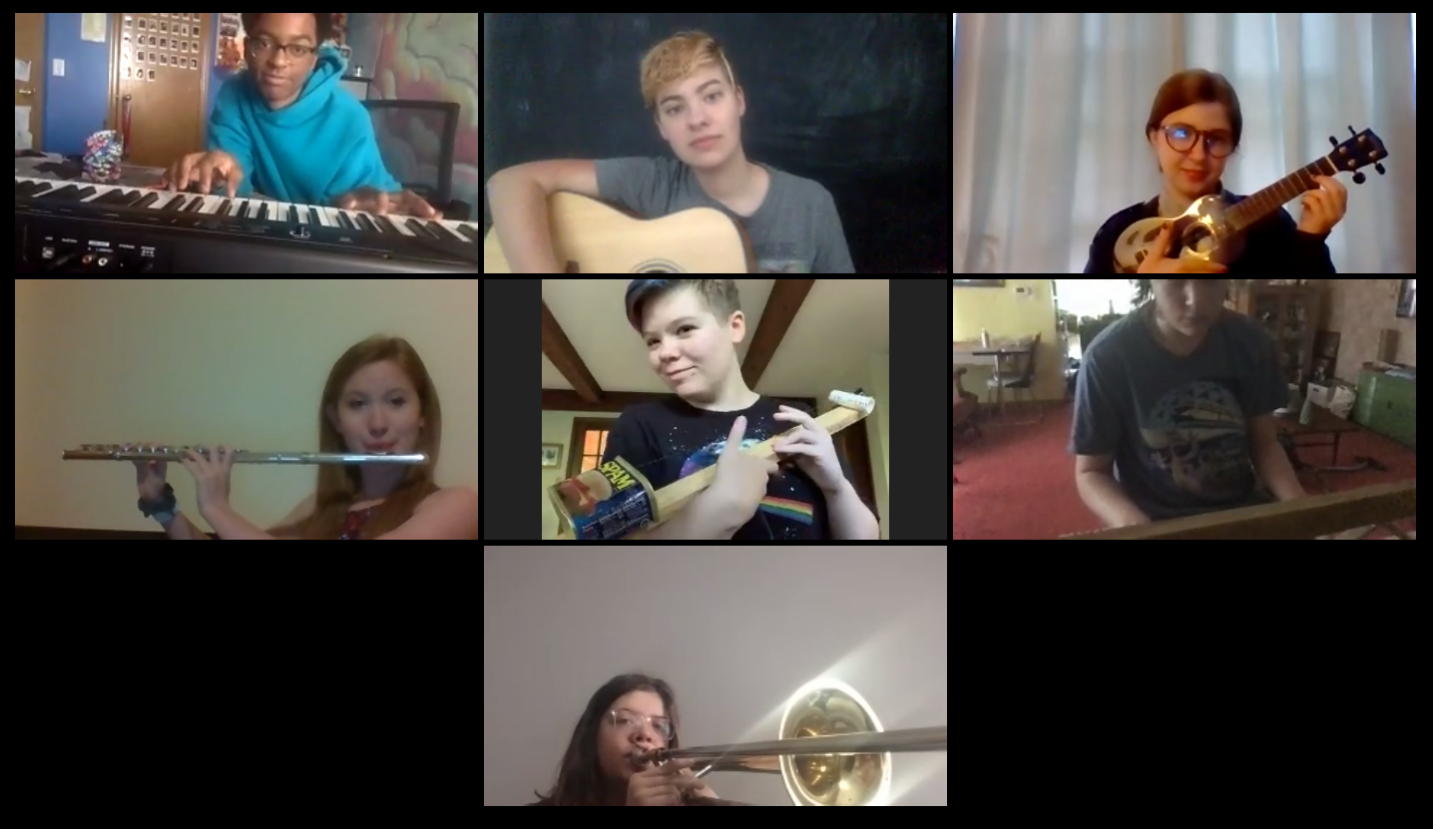
A door was opened on a new kind of creative process where we were the guides of our own journey, the captains of our own ship “bound for a voyage of exploration.”
–Isabella Manhart (High School Junior)
Quarantine thrust us head-first into a new era of theater creation, and with that, opened up a lot of opportunity for youth leadership and creativity beyond what we’re used to seeing “on stage.” From the start it was clear that our production process of devising Frankenstein was exploratory. We weren’t there to listen to lessons, or recreate the words of a script, we were there to learn through our experience, to create something one of a kind. A door was opened on a new kind of creative process where we were the guides of our own journey, the captains of our own ship “bound for a voyage of exploration.” –Isabella Manhart (High School Junior)
To ultimately give students creative control in their own Zoom stages, as directors we needed to create parameters to give students freedom within to succeed. As a co-director, I knew that this was going to be a different directing process then my pre-quarantine experiences in College. However, with an open mind and excitement, I was ready to learn alongside the students. The first week, we gave the students assignments to storyboard each scene with beginning, middle, and end. This way each student had a strong dramaturgical understanding of the story. Each day, we completed dramaturgical exercises around character, scene sequence, and visual impact. The ensemble was challenged to evaluate and discuss the shape and texture of each visual story moment. These discussions were recorded as “thoughtfulness work” and updated on our classroom website* for students to have 24 hour access to our documented joint “devising brain.” –Sarah Gordin (Rising Senior at Muhlenberg College)
Not being able to be in the same room created a sense of trust from the directors to create all of the production elements. Instead of only having to think about what to say, where to stand, and how to say it; we had to become our own mini tech crew, light operator, props master, makeup artist and costume designer. We still had entrances and exits. We still ran around “backstage” trying to find our props and get ready for our next entrance. It wasn’t as if we were on a zoom call. We got ready together, we had mistakes in our runs, and we had a tech week. Being able to illustrate each person’s creative talents in this way made for a very cohesive ensemble where everyone had a valuable part to play.–Eme Starbuck (High School Sophomore)
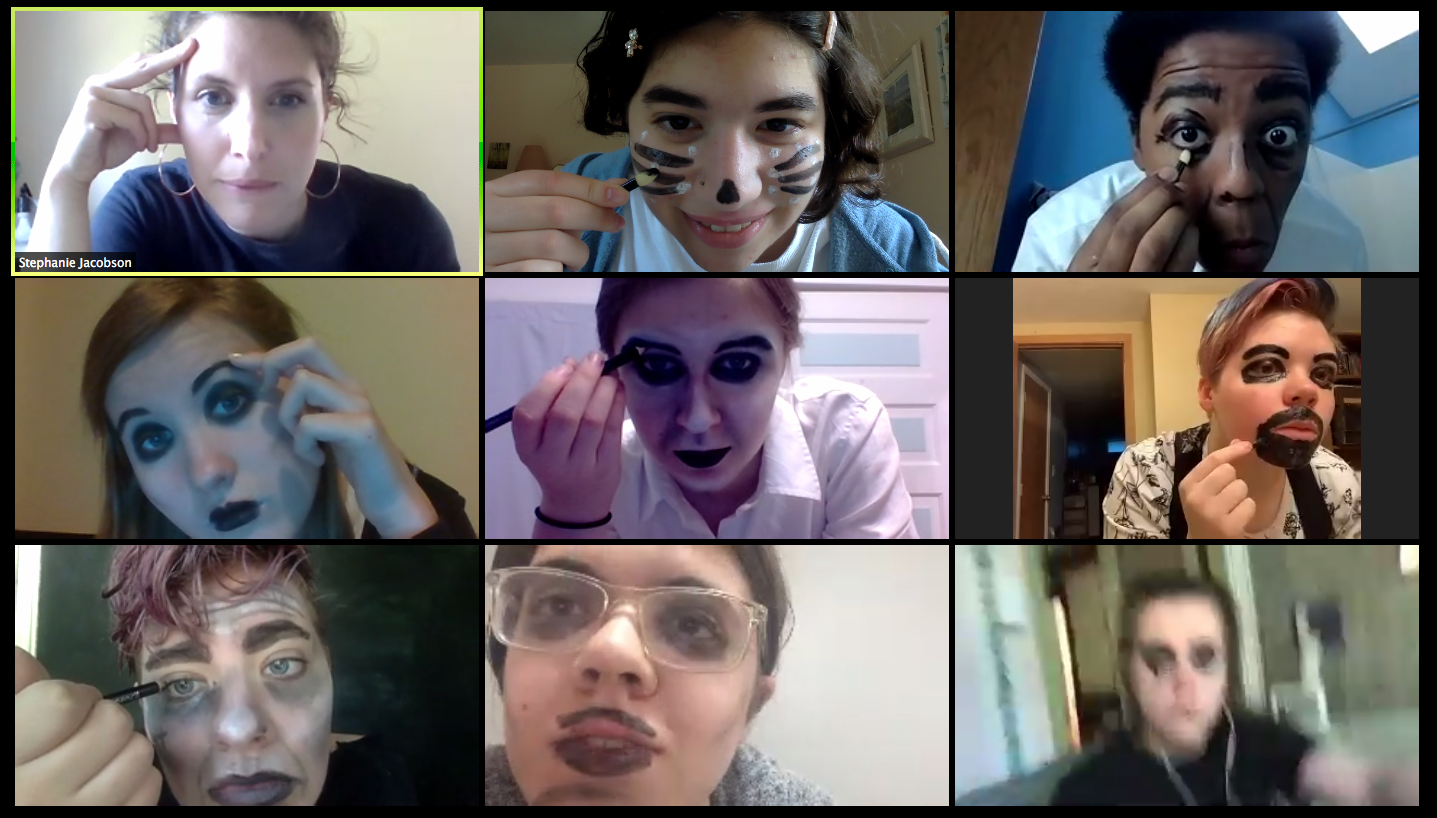
Our cast played many different parts. Most of the plays I have been involved with, I only had to perform one character. In Frankenstein not only did we have our characters, but we had our shadow boxes and other visual storytelling elements to be responsible for. There was one point in the play where I had to stand in front of the camera, with a magenta gel, turn off my camera, switch the magenta gel to a red one, stand behind my camera, turn it on, wave a pajama shirt rapidly in front of the camera to simulate fire, wait for my camera to be turned off, run to my light switch, turn off my light, put on a jacket, move a table out of the way, switch the gel to a blue one, touch up my makeup grab my flashlight, sit in front of my camera, turn it on, and then pretend to be strangled. This was all entrusted to me by the directors and my cast. No matter how small a moment in the play, it greatly would affect the ensemble. –Brianna Robinson (High School Freshman).
This was my first experience getting to be on the creative leadership team of the theatrical process and throughout I garnered the courage to take leaps of faith and to trust that my heart and passion for storytelling would guide me to land safely. I gleaned so much as a performer and director/collaborator. That’s not to say the process was easy, there were many twists and turns and full out failures to get to the final production. As a cast, we explored camera angles, the spatial capacity of the Zoom screen and found object imagery in the shadow boxes. These exercises allowed us to gain artistic confidence within the parameters of the Zoom platform.–Wayne Hudson (High School Senior)
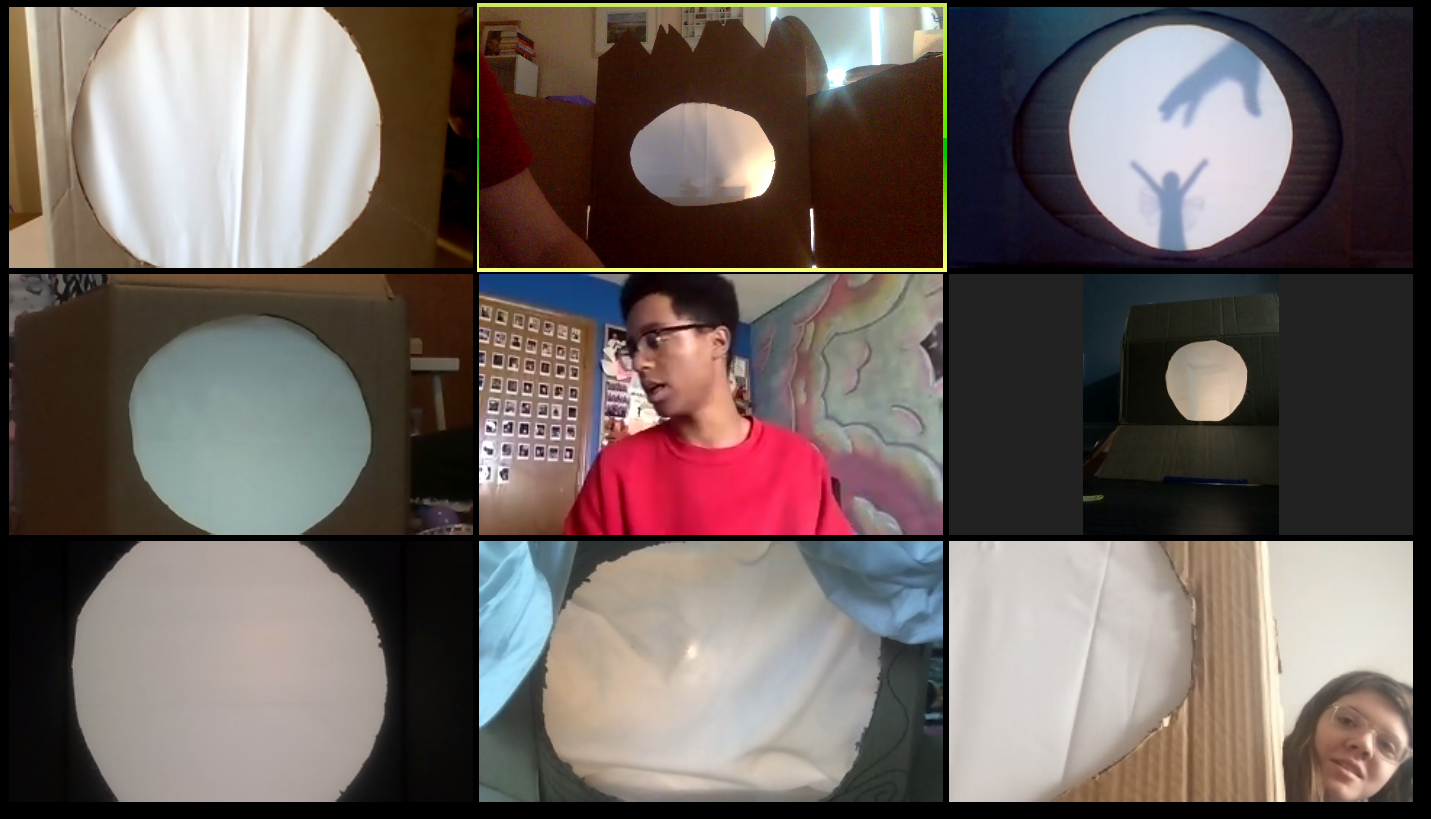
Devising a piece to be performed not only digitally, but also silently pushed us to consider all the elements of our production in a new light. The physical disconnection of being in our own spaces started as a challenge, an opposition to the unity of the piece we were trying to create, but we soon realized this gave us a lot of freedom to showcase the unique abilities of our cast. Zoom was our stage, and it was a great one. -Isabella Manhart (High School Junior)
——————————————————————————————————————–
“At its core, theatre is about connection” –Noemi Gilbert (High School Sophomore)
In addition to an opportunity to create theater, Conservatory gave us a space to have impactful discussions about the world around us. We were truly viewed as professionals as we explored the craft through a variety of workshops on everything from musicals, to movement, to theater for social change. We got to discuss and debate the issues that really stuck out to us and how to give voice to these issues through our art. I remember in particular a conversation we had centered around the question, what is a stage? That really got me thinking. As we worked to develop theater for social change, we came to the realization that a traditional stage, a traditional theater, isn’t always the most accessible way to reach the people who we are looking to make space for. We’re so used to waiting in the wings, creating and sharing a space for our audience to explore, but the term stage is so much broader than that, especially now. –Isabella Manhart (High School Junior)
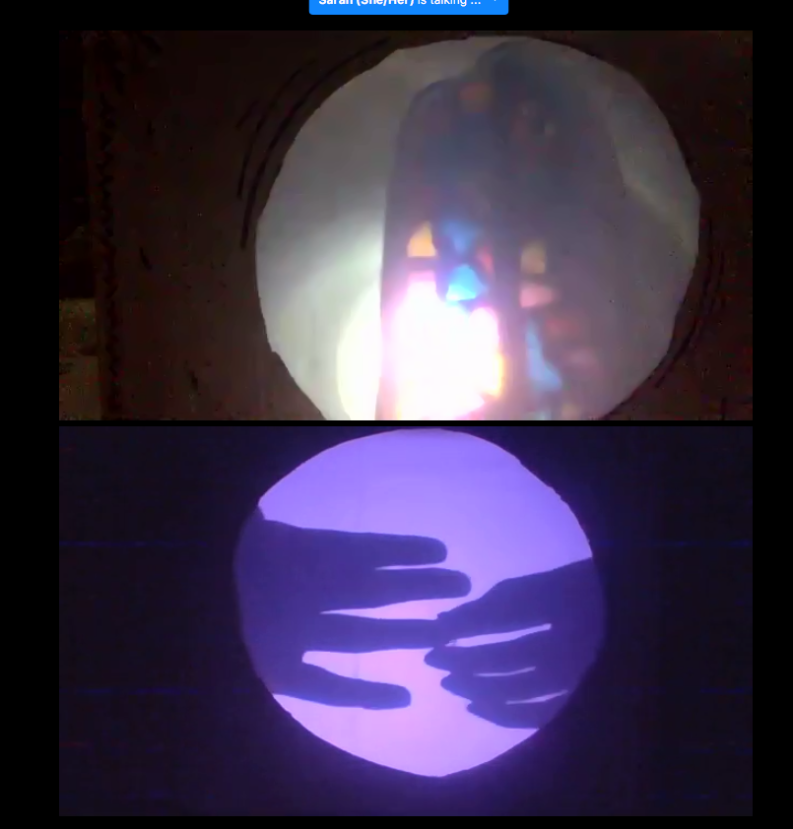
At its core, theatre is about connection. When I’m onstage, I feel such an amazing connection with the character, with my fellow performers. and with the audience. For our Zoom Frankenstein, internet connection was spotty sometimes, but the connection and friendship that makes theatre…theatre, was as strong as ever. We were goofy, heartfelt, and we threw ourselves into creating. Our connection reminded me that when a bunch of creative theatre kids come together, we’re going to perform and make a show, that in the case of Frankenstein, literally came to life. Not being on stage may seem like a hindrance or an inconvenience to some people, to us, it was an opportunity for something greater. –Noemi Gilbert (High School Sophomore)
Quarantine is definitely not easy, but if we’re here, we have to take the time to learn and grow so that when things change for the better, we haven’t wasted away in the process.
–Wayne Hudson (High School Senior)
There is so much ugly in the world, so much to miss because of shelter in place, so much to want to change back to the way life was before COVID 19. However, by getting lost in that nostalgia, we miss out on the things we could be taking full advantage of under these circumstances that are completely unique. Doing a show online may not be ideal, but quite frankly I wouldn’t have had Conservatory 2020 Frankenstein in any other form. Quarantine is definitely not easy, but if we’re here, we have to take the time to learn and grow so that when things change for the better, we haven’t wasted away in the process. This is history we’re a part of, they’ll write about this moment in textbooks and essays. Conservatory 2020 taught me to make sure my voice was on the forefront of that history. –Wayne Hudson (High School Senior)
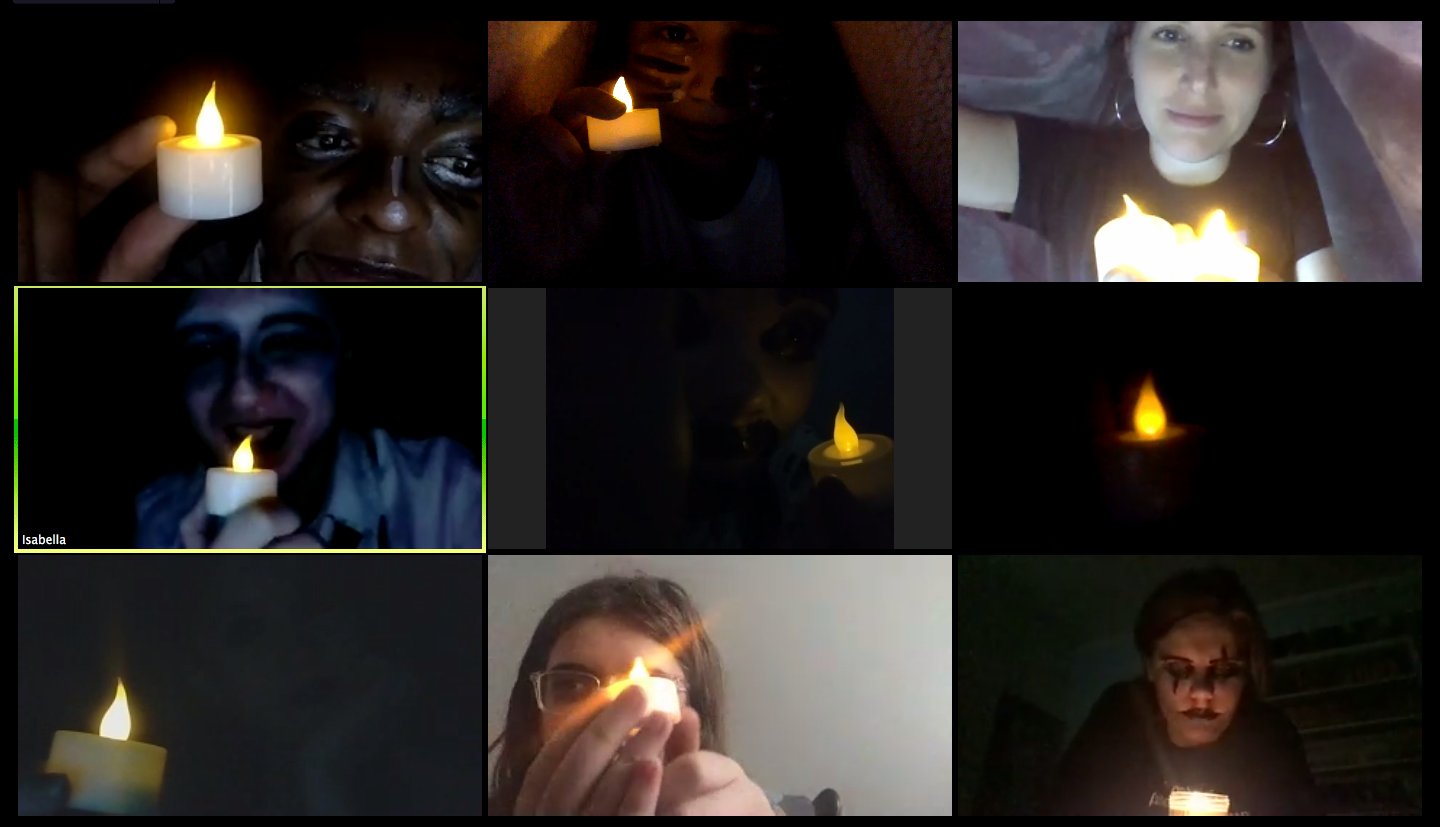
——————————————————————————————————
The Soul of an Ensemble by Jules Wuestewald
There are mysterious feelings and unexplainable things found in art
If they can’t be described
They can be felt and expressed through different mediums.
I discovered that, when I joined the Rose theater camp
June of 2020.
There is a very deep aspect of artistry
A part of it you can’t master
Or memorize by repetitive practice.
It’s something that you have discover inside yourself
Soul.
Soul is found within one’s passion for something.
Whether it be something they have created, a talent, it can even be discovered through inspiration. Every person you ask will tell you a different journey and their very own story about finding their soul in their art.
One of the reasons it can’t be taught.
Soul can be seen in many forms
It is seen and felt in the demonstration of what has been found.
The performance
The show
The expression
The words
The poem
The music
The song
The picture
The photo
The description
And even the silence.
It can also be seen within someone.
Many people mention a very specific gleam in their eyes
The eyes of the creator, the eyes of the viewer or the listener,
The eyes of everyone who can feel the Soul radiating throughout the room.
It fills the seemingly vast realm of silence.
The same type that holds all of that indescribable emotion.
I’ve been lucky enough to be in the presence of many great creators
Young, passionate, aged and experienced.
I think all of them would agree with me when I say
Soul is heard when that silence is disturbed.
A silence that can also be forced
Via societal conformity.
Left undisturbed out of the feared results of it breaking.
There are just some silences that need to be heard.
But in our case the silence needed to be diverted.
And used to create a space, a place, and a mind
where we could escape aspects of our current situation.
And even more
Use our situation to our advantage.
This experience of creating a work of art
Fueled by the passion and determination of brilliant, creative people
Who logged on to the call knowing
They would be forced to think outside the box
And find a balance between the familiarity and new limits.
Proves that soul is not only within the art itself
But within the people who create it.
It doesn’t take a theater to put on a play.
All it takes is a group full of soulful passion and fierce determination.
And a little bit of imagination.
And..maybe a cardboard box.
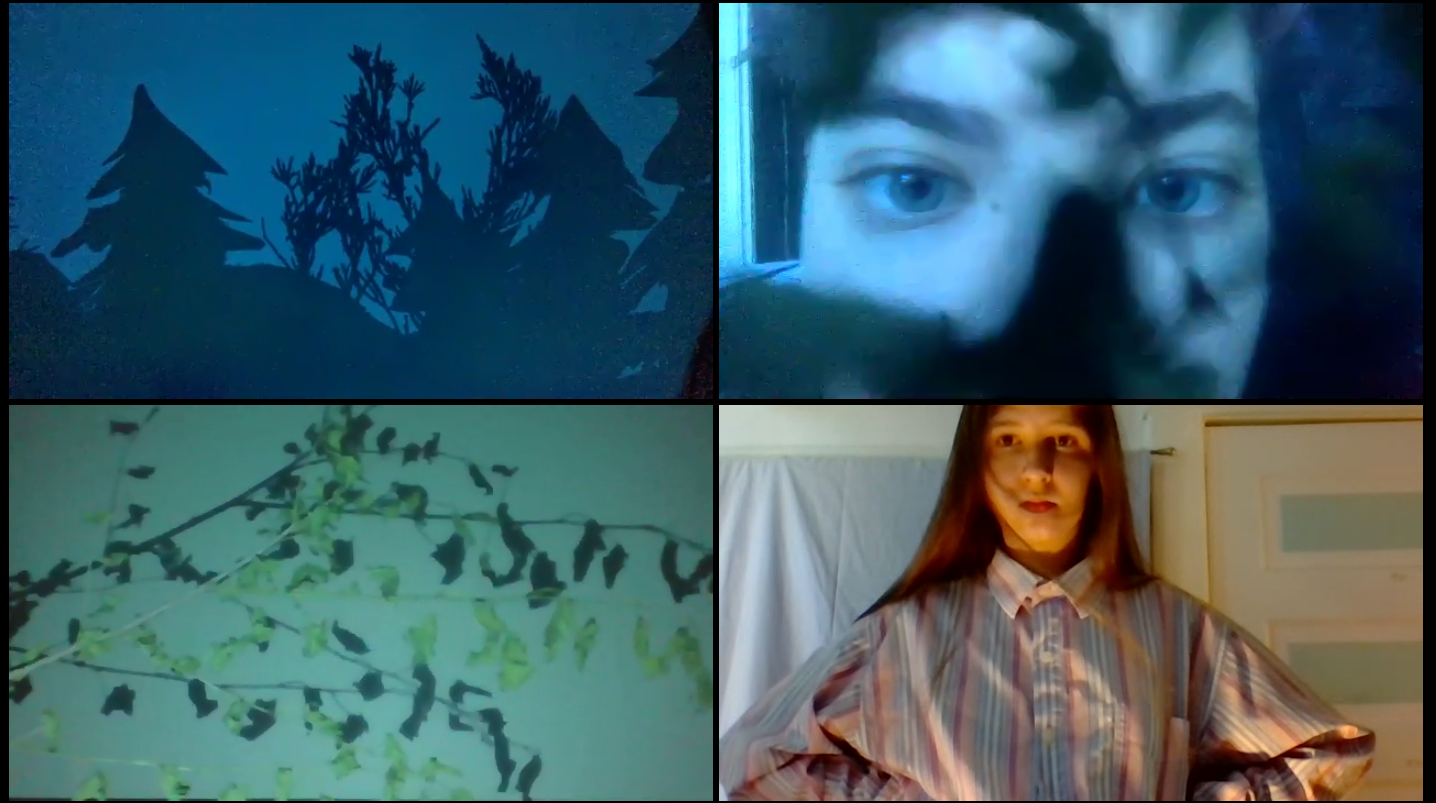
————————————————————————————————————
*The classroom website documenting the process and production of the Frankenstein cast is located here: https://roseconservatoryfrankenstein2020.weebly.com/
**To watch the full production please follow this link (CC): https://www.youtube.com/watch?v=R7h0804-9EA&t=289s
Our Writers:
CO-DIRECTOR/ GRANDFATHER/ PUPPETEER. Wayne (he/him) is an upcoming senior at Millard North High School as well as High School Intern at the Rose Theater! Conservatory 2020 marks Wayne’s directorial debut and first act as Intern at the Rose, and he’s very excited to see what the cast has created through this new and exciting medium.
CREATURE/ PUPPETEER/ GUITARIST. Noemi (she/her) is a rising sophomore at Central high school. She enjoys both performing and working on scenic crew. She is also sophomore representative on the drama leadership board. Noemi enjoys writing for the school newspaper, being on the Academic Decathlon team, and participating in Students for Sustainability.
ELIZABETH/ PUPPETEER/ FLUTIST. Eme (she/her)is a upcoming sophomore at Bellevue West High School. In addition to theater at the Rose, she is also a part of the competitive speech team at West. She recently attended the MASQ speech tournament: an online tournament that was put on by the organization that puts on the NIETOC nationals every year.
VICTOR/ CELLIST/ PUPPETEER/ SCRIPT ADVISOR. Isabella (they/ them) is going into their junior year at Omaha Central High school and has been a Rose folk for a great number of years. They are particularly passionate about writing plays that explore how to talk about gender identity with young audiences. They love art of all mediums from visual art, to poetry, to theater and they are the cofounder of the Creative Change Initiative at Central where they use their love of art as a lens for social justice. Honorable Mention at the Theatre Mania Young Playwrights context, Not Invisigirl. As well as Runner Up in the Young Playwrights for Change Festival in 2017 for the same play.
WALTON/ PUPPETEER. Jules (She/Him/There’s) I will be a sophomore at Westside high school. I am a slam poet who has preformed all around Omaha. I absolutely love preforming and I’m super excited to explore new ways to do so through platforms like this. Theater is such a big part of who I am.
SON/ WILLIAM/ FATHER/ TROMBONIST/ PUPPETEER. Brianna (she/ her) is going into her freshman year at Elkhorn South High school. This is her first time doing Conservatory and she has had a great time getting to know the rest of the cast and also meeting their pets, plants, and nieces.
CO-DIRECTOR/ SOUND ENGINEER. Sarah Gordin (she/her)is a Teaching Artist, Director, and Performer who attends Muhlenberg College in Allentown, PA. Her favorite shows that she has directed include Shrek Jr (also Choreographer and Music Director), Dead Girls No Mothers by Rosalind Sullivan-Lovett, Ways You Can Survive the World by Jennifer Tuckett, and Cagebirds by David Campton. She was a Production Assistant/Directing Observership on Dancing Girl as part of the She NYC Arts Festival. She has interned at the Civic Theatre of Allentown, Gas Lamp Players, and Broadway Workshop. She writes for OnStage Blog, was the coordinator for the theatre education outreach programs at Muhlenberg College and a performer in DanceMax Moving Company which was a touring original children’s theatre group across the Allentown area and Philadelphia. www.sarahgordin.com
CO-DIRECTOR. Stephanie Jacobson (she/her)is the Early Education Director, Teaching Artist, and Director and at The Rose Theater for the past 14 years. She was recently awarded the Ann Elgood Youth Theatre Director of the Year from AATE alongside her long time collaborator Michael Miller. Stephanie has her MFA in Acting from the University of Iowa and alum of The Eugene O’Neill Puppetry Festival, and is a trained puppeteer specializing in shadow puppetry and Bunraku. Before moving to Omaha, she
lived in NYC where she worked with Liz Swados on her production of Jabu in an extended run at The Flea Theatre, Lee Bruer’s production of Mabou Mines’ A Dollshouse National and International Tour, Taylor Mac and The Jim Henson Company. www.stephaniejacobson.weebly.com